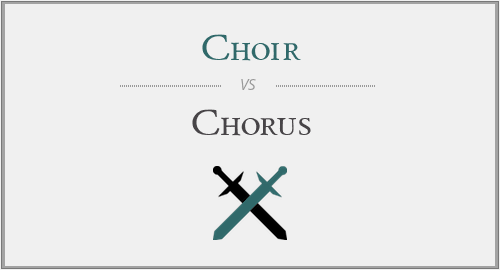A pair of very often misspelled words in English is represented by the “choir” and “chorus”. In fact, it’s not necessarily a problem of misspelling, but more of a problem of misunderstanding, of confusion. They are used in the wrong contexts, with the wrong significations, sometimes replacing one another – which is, of course, an error, because the words define different concepts.
Even though there are several similarities between “choir” and “chorus”, it’s important that you understand the difference between them in order to use them correctly. We’ll explain these for you right now.
Choir vs. Chorus
Both words are related to music, to singing or singers. The fact that they are spelled similarly and are also used within the same domain makes it even more difficult to distinguish their meanings, and even more tempting to confuse them.
But it’s actually easy to remember their difference. How? Well, first of all, by remembering the definition of “choir”, which is very short. And secondly, by noticing that “choir” can also be used as a noun, while “chorus” can function both as a noun and as a verb, in various contexts.
When do we use “choir”?
“Choir” only and always functions as a noun. The word is used in the musical domain and it defines a group of people who sing together.
Example: The school choir will participate in the group singing competition. – “choir” refers to a group of people that sing together.
When do we use “chorus”?
Mainly, when used as a noun, “chorus” is defined as the part of the song that is repeated several times, the refrain. Secondly, it can also refer to a group of dancers or singers in a show, who do not have the main part. Occasionally, “chorus” can also be, somehow, a synonym for “choir”, but it is used when referring to larger “choirs”, to a large group of people who sing together. As a verb, “chorus” is only used in British English, in the UK, defining the moment when two or more people say the same thing, at the same time.
Example 1: Please sing the chorus again, people love it! – “chorus”, as a noun, is synonym with “refrain”.
Example 2: The chorus beautifully accompanied the protagonists of the show. – “chorus” can also define the singers and dancers in a show that do not have the main roles.
Example 3: All people in the church started to sing, forming a beautiful, melodious chorus. – “chorus” can also refer to a “choir”, a group of people singing together, but only a large one.
Example 4: I heard them chorus “Evrika!” and I knew they did it! – “chorus”, as a verb, refers to more people saying the same thing simultaneously.
Conclusion
Both “choir” and “chorus” refer to the music/singing domain, both involving people and, usually, groups of people, and they have quite similar spellings. Despite these, their meanings are distinct and they should be used accordingly, not confused. Remember the explanations above to make sure you avoid any kind of misspelling in your messages.





Have a discussion about this article with the community:
Report Comment
We're doing our best to make sure our content is useful, accurate and safe.
If by any chance you spot an inappropriate comment while navigating through our website please use this form to let us know, and we'll take care of it shortly.
Attachment
You need to be logged in to favorite.
Log In